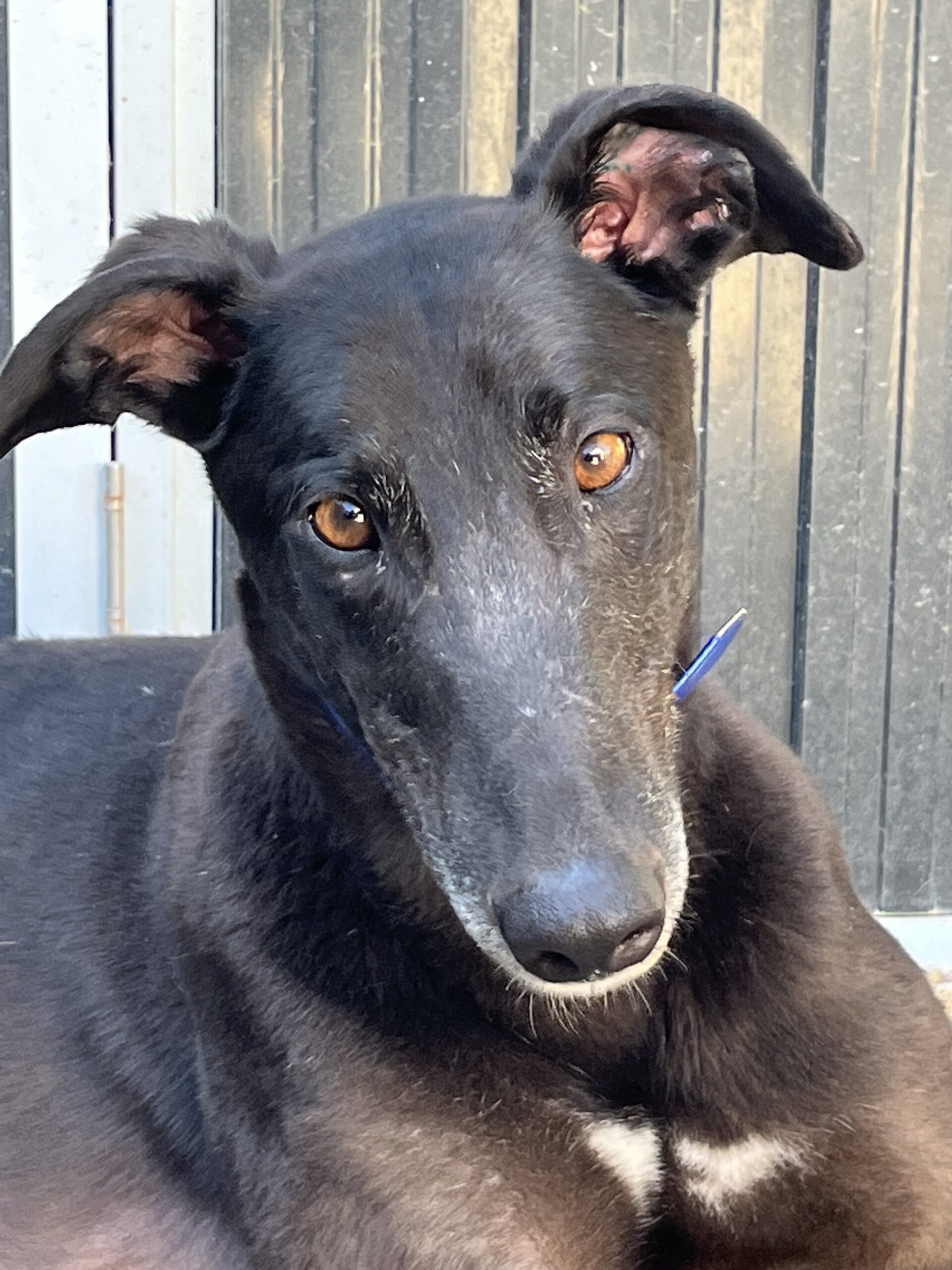 Some Common Questions about Greyhounds Answered
Some Common Questions about Greyhounds Answered
Please feel free to ask any questions we have not covered using the form below and we will answers to those.
I live in a flat, am I suitable to adopt a greyhound?
You may be suitable to adopt a greyhound, it depends on individual circumstances. A ground floor flat with a private, fenced garden, if owned/mortgaged to by you should not pose any problems, but a 2nd floor flat with no garden would be far less suitable and it’s likely we would turn your application down.
There are of course several variables between the above two examples so we would recommend that you contact us to discuss your individual situation. If you are a tenant in a flat (or a house) we reserve the right to ask for proof from your letting agent that dogs are permitted.
Why are greyhounds muzzled?
Racing regulations for active racing dogs require that muzzles be worn by the dogs when they are out exercising. Retired greyhounds have no such requirement. Having said that, most recently retired greyhounds have had little, if any contact with other breeds of dog. They are generally very sociable with their own kind, but many are confused by what is expected from them around unfamiliar breeds initially.
Some greyhounds find other breeds frightening, some are not bothered by them at all, some are interested only in running dogs (please bear in mind here that greyhounds have been bred and trained to chase small fluffy things throughout their racing career). A few greyhounds, given to opportunity would chase or even bite other dogs. For this reason we strongly recommend that you use a muzzle on your greyhound until you are 100% confident that it will be friendly and sociable with all other dogs of whatever shape and size that it meets.
Even when reliable on a lead with other dogs, please still consider this scenario – Would you be able to react quickly enough to prevent your on the lead dog from diving into a hedge and extracting a sleeping cat? With a greyhound the answer, realistically is no. When off lead exercise is given, again we strongly suggest that you use a muzzle on your dog. Even the best tempered greyhounds can still have their chase instinct triggered by squirrels, rabbits, deer and cats.
A 40mph dog is not one you will be able to catch! Please therefore help to protect the reputation of the greyhounds we are working to save from potential bad press and most importantly protect other animals from danger by being a responsible greyhound owner and choosing to use a muzzle on your dog.
I have a baby and a toddler, can I adopt?
We may be able to find greyhounds suitable to live with babies and toddlers, but your choice of dog will be severley limited and you may have to wait some time before the right dog is found. We are very conscious of the vulnerability of children and also that children do not always do as they are told.
Whilst most parents are sensible enough to understand that a child should never be left alone with a dog that is actually quite a hard thing to stick to. Consider this scenario: Your toddler is watching his/her favorite TV program, the dog is asleep in the same room as you and your child and you need to make a quick trip to the bathroom/answer the phone/make a cup of tea etc. Are you really going to take the child or the dog with you every time you leave the room to ensure that the dog and child are never alone together?
Greyhounds are generally calm, gentle and loving dogs, but a household with young children can be stressful for the people and the pets. We are therefore extremely cautious when homing in this situation.
How much does it cost to have a greyhound?
The costs involved in keeping a greyhound vary hugely depending on all sorts of things.
The initial costs would be the adoption donation of £150 which would also provide you with the leather collar, lead and a muzzle.
You’ll need to provide a bed, 2 bowls, a feeding stand (recommended), at least one winter coat, food (these costs vary depending on what you choose to feed but a mimimum of £7 per week is probably appropriate).
You’ll need an ID disc, poop bags and grooming equipment. There is the regular parasite control of wormers and flea treatment to consider along with the cost of annual vaccination.
Insurance is probably the biggest variable, with costs ranging from £5.75 per month for the most basic of covers up to perhaps in excess of £60 per month for an older animal with a “top notch” policy.
We strongly recommend pet insurance in some form, to cover third party liability as a minimum. Being a dog owner means you are legally responsible for the actions of your dog – It is your home and finances that are at risk if you are sued for the actions of your dog, but the question of whether you could provide several thousand pounds to pay for treatment of a severe accident is another where pet insurance needs thinking about.
I’ve heard that greyhounds can’t live with cats, is this true?
With the majority if greyhounds it is true, but not in all cases. If you have a cat and you are interested in adopting a greyhound then we can probably help. Having said that you will likely have to join a queue of like minded people and it is therefore unlikely that you’ll be able to adopt quickly.
Greyhound lifeline don’t like the term “cat friendly”, we consider it to be misleading. We prefer the term cat trainable which is more realistic. It’s extremely unlikely that your new dog and your cat will be safely living together from day 1.
We do regular cat testing, but even a dog that passes well will still require extreme caution and vigilance around the cat(s). Use of the muzzle and keeping the dog on the lead in the early days are essential for the safety of your cat(s).
Please only take on a greyhound with a cat if you are fully committed to making it succeed.
Do greyhounds need a special diet and how much should I feed?
Greyhounds don’t need a special diet, they are pretty straightforward to feed. At the end of the day the choice of feed is down to you, it’s a case of what suits you and your greyhound, but if you feed a complete dry you ought to be looking for a protein content of around 20% and for something with no (or very little) artificial colouring/flavours.
Higher protein levels may make your dog hyperactive, lower level may mean he/she cannot maintain a healthy weight and lacks energy generally. In the home a dry complete feed, plus a little something in the way of tinned meat/fish and some warm water will satisfy most greyhound palates. Some people choose a raw meat plus veg diet, others may cook their own. The important bit is to feed a diet that is suitably balanced for a dog’s needs. Complete dry with complete canned is the simplest solution for this.
The quantity to feed your greyhound will depend on your dogs personal metabolism and how much exercise he/she is given. In our kennels most of our smaller dogs get 1.5 mugs of dry feed twice daily and our bigger dogs get 2 mugs of dry feed twice daily plus canned food/meat juices. There are exceptions to every rule though and that is a vague guide only.
If your greyhound loses weight, increase the feed amount. If your dog is getting fat, reduce the quantity fed.
Have you got a question we have not covered?
If so please leave a message below and we will do our best to answer these in the main FAQ here.
Thanks Greyhound Lifeline.








Good Morning
My partner is a very keen walker and probably walks a minimum of 5 miles a day. She has been a dog owner in the Past and still loves dogs passionately.
Unfortunately we do not feel ready to house another dog in the near future but she would so much like a dog to walk on a regular basis.
Do you, or can you, run an adoption scheme whereby I could make a yearly donation to the upkeep of one of your dogs thereby allowing my partner to walk it daily?
I hope you have a lovely Christmas and look forward to hearing from you soon.
Kindest regards
John Granville
Dear John
Thanks for your comment.
We don’t have the facility to do exactly as you ask. There are option though.
One choice is to sponsor Jack through our parent organisation the Retired Greyhound Trust. Jack is in our care and he is an official RGT sponsor dog as well.
Another choice would be for your partner to join us as the kennels any day at 11am. Walking commences daily at that time. It may be possible for your partner to walk their favorite greyhound, but that dog may have already been allocated to another person, or may not be suitable to be walked by your partner. All depends on your partner’s strength and experience and whether that is a suitable for the chosen dog. Obviously viewings for any dog must take priority which may also prevent your partner walking a specific dog at any time.
Possiby the best way forward is to come along to the kennels and chat to us.
Regards
Marie Harris
I am 68 years old, but am fit and healthy and love walking; I have a town house with a courtyard garden, would either of these things prevent me from being considered as a potential owner please?
Hi Patricia
We have no upper age limit for adopters it’s simply a case of finding a greyhound of a suitable temperamnet for your situation. A courtyard garden is not a problem either as long as it is securely fenced/walled. If you are interested in finding out more about adoption please call wither Jane or Carol. Thank you.
Regards
Marie
how much is a greyhounds vaccinations ???
Hi Samantha, Vaccination costs for greyhounds will vary hugely. It will depend on whether your dog needs a full cover booster, just the Leptospirosis booster (some practices cover all risks annually, others will only require the Lepto annually and do the remainder every 3 years). Of course your dog could need a complete course (2 injections over a 2-4 week time span and possibly kennel cough as well if you want that done too). To obtain an accurate price and to find out what your dog actually needs vaccinating for we suggest that you call your local veterinary practice to discuss it. Marie
Can a greyhound live in a apartment and get about 2 – 3 walks a day for 30 – 40 mins each and twice or three times a week a good off leash run in a fenced area?
Dear Juli,
There are greyhounds that live happily in apartments/flats under similar circumstances to those that you describe. Some homing groups (and even other branches of the RGT) are quite happy with this arrangement.
Generally however we would not go forward with an adoption in these circumstances for a variety of reasons of which we’d be happy to explain by email rather than on the public forum. I hope this has answered your enquiry in general terms.
We do look at each potential adoption on an individual basis, more information would be needed in order to give you an answer on the possibility of adoption through us in your own case. Regards, Marie.
Hi, 2 years ago I went along to the local Dogs Trust (Salisbury) and met my stunning brindle, fairly large greyhound (37 k) and have now fallen in love with the breed (he had been with them 2 yrs and came rather angst). My now very chilled boy is starting to mature (bout 9/10 I’m told) and would love for him to find a fairly quiet companion. (I have had dogs for 19/20 years now).
Very relaxed farm home to offer (& quiet), stressless and lots of fields, woods, safe environment (fences 6 ft around garden). One adult owner (just me) and when not working I spend all my time at home in the garden.
My question is that I do work approximately 15/20 mins from home, but during the week only and do come home at lunchtime to let my boy out to spend a penny, say hello etc. My neighbour does also have a key in case of any emergencies (there has ***** been a need to use it).
Would this be a problem do you think please? I do appreicate it takes time and consideration to get a dog up to the point of being able to leave them,, either on their own or with another and have been through that a couple of times before, if that helps.
Kind regards
Hi Lizzie
Working, but coming home at lunch time to see to your dog would not normally prevent an adoption. We just need to find a suitable dog that would be happy to be left for reasonable periods. Your enquiry covers several points to we’ll email you privately in order to respond properly. Kind Regards. Marie
my dog is always after food he is a real scavenger but i love him to death he can reach anything even had the fish food one day and i just caught him in time i was buying him james wellbeloved dog food i now feed him on IAM when i first got him he had retired from racing and was very skinny the fur on his tail was not to good now he has put on some weight and his fur is lovely should i be careful with is weight i take him out every day and once a week we go for a long walk i’m missing out on all these great shows that you have as they are to far away and i do not have a car are there any shows in south east london I would also like to know if you have a charity shop down this end
We don’t at present have a charity shop, we raise funds on a more local level at fairs and dog shows etc. You should be able to find out about greyhound events that are nearer to you by visiting http://www.retiredgreyhounds.co.uk There is a section on their website which lists events organised by all the RGT branches so there ought to be something coming up in your area before too long. Regards, Marie
my greyhound has just started eating her own poo is there any reason for this.
Hi Richard
With eating poop there is rarely a straightforward and simple answer. There are many various theories on why dogs do it and how to stop them. We have seen it in a few greyhounds that come to our kennels. It is thankfully not at all common, but quite disgusting none the less to our human sensibilities. We suggest that you start with a vet visit to rule out any potential deficiencies in your greyhound’s diet or any underlying medical condition that may have triggered it. Most likely it’s behavioural in some way. There is no “quick fix” however that we know of and we can only suggest that you do your own research and try a variety of solutions to find a regime that works for you. Good luck.
I have been considering adopting a greyhound for some time.we have a 14 year old Labrador that is no longer able to do long walks,shes happy and content.but I do miss my walks.
My concern is however that we take our dog in the caravan for odd weekends and a weeks holiday.
Would this prevent me from adopting?
Hi Joy,
Taking a greyhound away for holidays in a caravan would not prevent you from adopting at all. We have many adopted hounds that enjoy camping and caravanning holidays with their families. Until you know how your dog behaves in such a situation it just a case of keeping the dog under full control i.e., on a lead and possibly muzzled (depending on the individual dog if there is a chance of meeting other animals), just in case he/she decides to go wandering on their own. A mobile number on the ID *** and a temporary address (where you are staying) ID *** are also sensible additions for dogs on holidays. Marie
I have been finding very conflicting info on exercise and I would like to know how long you walk your Greyhounds for & how many days a week. I take my Greyhound & Whippet on 30min walks 5 days a week & play fetch in the backyard on the weekend. Any more than that & my dogs lay down in protest but I’ve been told they need more exercise than that. Help!
Hi Jennifer
Dogs need daily exercise for both mental and physical stimulation and to generally keep them happy and well adjusted. The amount of exercise any individual dog will need or want will vary depending on the breed, age, state of health etc of that particular dog. For greyhounds the ideal minimum is 2 x 20 minutes lead walking daily with some chance to play off the lead and to socialise with other dogs if you have a suitably safe area.
Some greyhounds can be built up physically to both enjoy and be physically able to cope with longer walks.There is no real hard and fast rule for exercise, as long as the dogs involved are happy and healthy and get out at least once daily for decent exercise then for a greyhound at least that is generally sufficient. Younger dogs may need and want more than this as their energy levels are naturally higher. Border Collies however would be absolutely “stir crazy and bored mindless” on such a small amount of time to stimulate their brain and body. Good luck. Marie
Just browsing and saw this post from last year. We had a boy who had ***** displayed this trait during his first four years. Once retired, his diet was changed and he started eating his own poop. We simply changed his diet. . We have since had another boy who insisted on eating his sisters poop Ugh!!
Would definitely recommend keeping to the bland looking completes, no colours, keep it simple and don’t use the very cheap options, they have little nutritional value
Hello,
My family and I have been really interested in finding a greyhound and are wondering if a greyhound could be left for about 7 hours a day (except on a weekend) in a large house with a large garden with a 6ft fence all the way around. Also would said greyhound be ok in the house with a bearded dragon, in a room upstairs with the door shut.
Hi Max
We would decline an adoption where a greyhound would be regularly left unattended for 7 hours a day, unless provision was made for someone to visit the dog sometime between hours 3 and 5 for at least 20 minutes to allow the dog a little attention time along with sufficient time to see to nature’s call.
Some people opt to employ a dog walker, but this is not a cheap option.
If you can get some care provision in place for the prospective dog we’d be happy to discuss potential adoption further.
Regards Marie
HI,
I,VE HAD MY RETIRED THREE YEAR OLD GREYHOUND FOR THRE MONTHS NOW & I HAVE TO SAY HE LOOKS BRILLIANT NOW.WHEN WE GOT HIM HE WAS SO STRESSED OUT THAT HE,D LOST ALL HIS FUR ON THE REAR END & STOMACHE & HE WAS COVERED IN DANDRUF
BUT HE,S GETTING HIS FUR BACK & HIS COAT IS GLEAMING.
MY ONLY PROBLEM IS EVERYTHING HE EATS ALTHOUGH HE SEEMS
TO ENJOY IT RUNS THROUGH HIM. HAS ANYONE ANY ADVICE THEY
CAN GIVE ME ON WHAT TO FEED HIM……….MANY THANKS.
Hi Bill
It’s good to hear that your greyhound’s condition is improving. Feeding can be a case of trial and error. Most greyhounds settle on whatever you feed them, but there are a few who seem to constantly have runny stools. You have not said what you are feeding, how much or how often so it’s little difficult to comment. If you’d like to email us with further details of your boy’s diet, his temperament (it is fairly common for nervous dogs to have loose stools) and exercise routine’s we may be able to assist further as there are several routes you could take which should improve things if not cure them. Regards, Marie
We have adopted a two year old greyhound a week ago and although she has settled quite well, she doesn’t want to eat. We tried the food supplied by the RGT to no avail. She did eat it when I added sardines but obviously that should not be a regular addition. Any suggestions?
Hi Sue, If you’d like to email in your contact number I’d be happy to discuss feeding with you. Thank you. Marie
We’re just about to adopt a 6 year old greyhound who is seriously under-weight because he has no teeth. An otherwise healthy dog, can you recommend a diet that would help him to get back to optimum weight, please?
Hi Jacqui, Lack of teeth is no reason for being underweight at all. I’d be a little worried if that is the story you have been told. We know of several completely toothless greyhounds and some with just a very small number who are a perfectly healthy weight. Unless the dog has an underlying health issue there is no reason for him/her to be underweight apart from he/she has not been fed enough food or food softened sufficiently to make it edible. Possibly a worm infestation may also have something to do with his/her problems. Ordinary complete food with a protein content of around 20% should be fine for your new dog once some weight has been gained. Soften it a little with some warm water and make it palatable by adding some canned meat/sardines etc.
Initially I would suggest 3 smallish meals a day of a high protein puppy food (25-27% protein) to boost him immediately. As he gains weight then that should be fine to reduce to twice daily meals. Depending on his size and metabolism when at a healthy weight you’d likely be looking at between 1.5 and 2 mugs full of dried feed per meal as a base. There are variations to that however, if exercise levels are high the dog will need more food. Good luck, but if your dog does not gain weight steadily on those suggestions I would consult your vet as there may be other issues at work. Also bear in mind that different people have different views of underweight. Like humans some greyhounds are naturally slimline and others are very solid. Good luck with your new dog. Marie p.s. A toothless dog can still eat dog treats, just make sure that if they are hard ones they are broken into smallish pieces.
Good evening,
I have a one year old Greyhound cross Saluki and i cant stop her from chewing but it is only wire and only when we go out.
I have tryed hot source, bitter spay, curry powered everything told to be by they vet and other people she loves them all. I am just lucky that all out electirc is turned off when we go out.
Can you help me?
kind regards
Hi Victoria, I’m sorry to hear about your dog’s chewing issue. There can be a multitude of reasons for a dog to chew and in a youngster teething can be a major cause. Other than that there is always attention seeking, boredom, hunger, lack of exercise/mental stimulation and even plain ingrained bad habit to consider. All I can suggest is that you look for a properly qualified behaviourist and ask for help from them. Each case is very individual and as we don’t know your dog or domestic set up we can’t comment with any accuracy. Good luck finding a solution. Marie
Hi,
Do you know generally how greyhounds would likely be around hens? I have a very small flock penned at the back 3rd of my back garden,
thanks
Hi David
It will depend entirely on the greyhound, many will be interested in what they are but some will want to be in there with them, especially if their chase instinct kicks in. If you have or are thinking about getting a greyhound and they seem to have a calmer side then they may take to them after a while of getting used to them. The best thing would be to ensure the hens are securely fenced in and walk the greyhound around their enclosure on a lead to see what their reaction is, preferably before you adopt the greyhound.
Hope it works out for you and your hens.
Lucy
HI,
I live in a rather large ground floor maisonette with a medium fenced in private garden and two cats. I have a lot of experience with dogs and was wondering if I would be suitable to adopt a greyhound.
Thank you
Hi Jess
Thank you for your enquiry. We would require your fencing to be 6ft on all sides, including a secure gate if you have one leading into the garden. Some of our greyhounds pass their cat test and go into homes with cats, with further training by their new owners they learn to live with the cats. Currently we do not have any greyhounds in our care that have passed their cat test. If your fence is 6ft high then please keep looking on our website until we have a cat friendly greyhound.
Lucy
We have had our retired greyhound for three years now. We used to have two cats whom she got along well with. The cats have now both died, sadly. We would like to have another dog but don’t have room for another greyhound in the house. Any ideas about which other breeds a greyhound might enjoy living with? Or even if it is a good idea for her to have another dog in the house? She likes walking and being in the house with other dogs that she knows well, and is enlivened by their company.
Hi Emma
Sorry to hear the news of your cats. Without knowing your greyhound it would be difficult to say which breed would be suitable. Having a new friend for her seems like she would benefit from their company. It would be a good idea to think about when you are out on your walks – how does your dog react with other breeds? Is she better with larger breeds or smaller breeds? If you know she gets on well with all breeds, then that makes a little easier when visiting a rehoming centre. Make sure she comes along too so she can meet and greet the dogs and take an active part in choosing a friend. Good luck in finding her a new companion.
Hello I adopted a retired 4 year old black and white greygound with quite a keen chase instinct. We met him sevreal times at the centre and he seemeed lovely. They said he had touch training as he backed away from pepople to start with but now he loves his cuddles. We took him home tuesday afternoon he settled in well and ran round the garden lovely.
Eversince all he does is sleep and bearly move he will not get up to go out. We wait till he looks more alurt and try calling him and tempting him up with trests but he will not move. At touch training we were told not to plull him or make him move only encourage him. We have tried that he wont even move for a treat. When my partnet took him out this morning he was trembeling before they even got out the door. I also feel he is having to much food i was told to feed him 3 resonably large bowls with a mix of dry and wet food a dsy. He has the wet food mixed in to soften it as he has had a lot of teeth out. Just seems a lot of food for a very inactive dog. I can not house train him becase he will not go out so i can not reward him for going outside. When we first got him we could tempt him out but he is gtting worse and even tries to avoid us putting his muzzle and harnes on. I have asked the centre for help but they said not to make him get up if he does not want to but this makes it imposible to house train him. He is lovely but i need advice please
Dear Kayla
Sorry to hear you are having trouble with your new dog. Without knowing him it is quite hard for me to comment on him. I would try to get him into a routine of going out into the garden for toilet training and walks. Place a lead gentle round his neck and encourage him to come with you. Try and ignore any negative behaviour from him as this will encourage this behaviour and he could become worse. Praise him only for doing what you ask of him. Allowing him to stay on his bed is allowing him to get his own way and could allow him to become dominant towards you. It may be that you need to look for a local behaviourist to help you through these early days. Advice on feeding, this again will depend on the size of your greyhound and without knowing him I am afraid I cannot comment on this. Good luck.
Hi
I have a very playful Border collie cross ***** who we rescued last August she is happy but craves the company of other dogs and will nearly pull you accross the road just to say hello to another dog. I work full time and she has 2 walks while I am away.She is also walked before I go to work and when I return. I would like to adopt a small male greyhound but how will I know if they will be compatible or if they will get on when I am away. I am worried that having another dog will change my dogs personality- what happens if you adopt and it all goes wrong?
Thanks
Laura
Dear Laura
Before you adopt another dog it would be a good idea to introduce your dog to some greyhounds to see how she behaves around them. If all successful it would be advisable to make an appointment with a greyhound rescue centre and talk with them about your dogs needs. The centre will be able to advise you on which male greyhounds they have that may be suitable. You will need to take your dog along to see how they get on. It sounds like your collie cross has quite a lot of energy! you may need to look for a quiet, calm male greyhound that doesn’t mind her energy! Good luck in finding the right dog for you and your family.
Kind regards
Lucy
Hi, My fiancé and I are really eager to adopt 2 greyhounds (that have been kennelled together) when we move to a larger house with a bigger garden. We both work full time, but we were advised that if there were 2 dogs together it would be easier for them to cope with being without us during the day. Is this true? My partner is a teacher so would be home all day for 13 weeks of the year too. We would plan to house them specifically in a room for themselves, acting as a ‘kennel’. Any advice you can give would be appreciated.
Thanks, Sam
Hi Sam
It is great that you are thinking of adopting a or two greyhounds. Many of our greyhounds get homed to people that work full time however you would need to find a way of breaking the day up for them. They shouldn’t be left for more than 4-5 hours at a time, some people come home at lunchtimes or have a dog walker to come in to see to their dogs. We would recommend adopting one greyhound first and settling them into home living and then adopting another after a couple of months. Sometimes to begin with there can be teething problems and can be harder to deal with if you have two new dogs. Hope this answers some of your questions.
All the best.
Lucy
I work 20 hours a week 6.5 per day but there is always someone in the house at some point between these hours. I also have two cats. Could I still adopt?
We would ask for the dog not to be left for more than five hours in one go before being given the opportunity to go into the garden. With regards to your cats, we would need to find you one that was cat trainable, there are not many greyhounds that are trainable but we do get them in.
We adopted a grey 2 weeks ago he’s 4yrs he seems to be settling in beautifully but since yesterday he has decided he doesn’t want to eat we have tried giving him all sorts but no nothing, could it be stressed related otherwise he seems happy he has the odd play with his toys but it is obviously a concern for us.